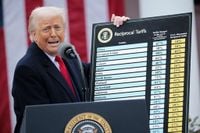Shares of major retailers took a significant hit on Thursday, April 3, 2025, following the Trump administration's announcement of sweeping reciprocal tariffs against U.S. trading partners. The new tariffs are set to take effect on April 9, 2025, and have ignited concerns among retail executives about potential impacts on profit margins and consumer prices.
Retail giants such as Target, Walmart, Dollar Tree, Best Buy, Dollar General, and Five Below all experienced declines in their stock prices as investors reacted to the news. In particular, shares of Best Buy and Dollar Tree plummeted over 11%, while Five Below's stock tumbled a staggering 25% in recent trading.
President Donald Trump outlined the extensive new tariffs on Wednesday, April 2, 2025, targeting goods from dozens of countries. This move has raised alarms among economists and retail executives alike, who warn that such tariffs could lead to increased prices for consumers and a slowdown in retail spending growth.
The National Retail Federation, in its assessment released on the same day as the tariff announcement, projected that retail spending growth could decelerate in 2025 due to the impending tariffs. This forecast has added to the anxiety surrounding the retail sector, which has been navigating a challenging economic landscape.
Several economists have voiced concerns that the higher-than-expected tariff rates will inevitably lead to increased prices for consumers, potentially dampening spending at a time when many retailers are already feeling pressure on their profit margins. Executives from companies like Target and Best Buy have previously cautioned that tariffs could negatively impact their financial performance unless they and their suppliers adjust prices accordingly.
As the April 9 deadline for the implementation of these tariffs approaches, some analysts suggest that there may still be time for negotiations to mitigate the potential fallout. However, the uncertainty surrounding the tariffs is palpable, with many retailers bracing for a challenging period ahead.
The stock market's reaction to the tariff news reflects broader concerns about the economic implications of such trade policies. The retail sector, which plays a crucial role in the U.S. economy, is closely watched by investors and economists alike, making the recent developments all the more significant.
In addition to the immediate impacts on stock prices, the tariffs could have longer-term ramifications for consumer behavior. With the potential for higher prices looming, consumers may become more cautious in their spending habits, further affecting retail sales.
The situation remains fluid, and as retailers prepare for the implementation of these tariffs, many are looking for ways to navigate the challenges ahead. The upcoming weeks will be critical in determining how these tariffs will shape the retail landscape and the broader economy.
As the market adjusts to the news, the focus will likely shift to how individual retailers respond to the tariffs and what strategies they employ to protect their profit margins. The retail sector's resilience will be put to the test as it faces this new wave of economic uncertainty.
In conclusion, the announcement of reciprocal tariffs by the Trump administration has sent shockwaves through the retail sector, prompting significant declines in stock prices and raising concerns about future consumer spending. As the April 9 deadline approaches, retailers are bracing for potential challenges that could reshape the landscape of American retail.





